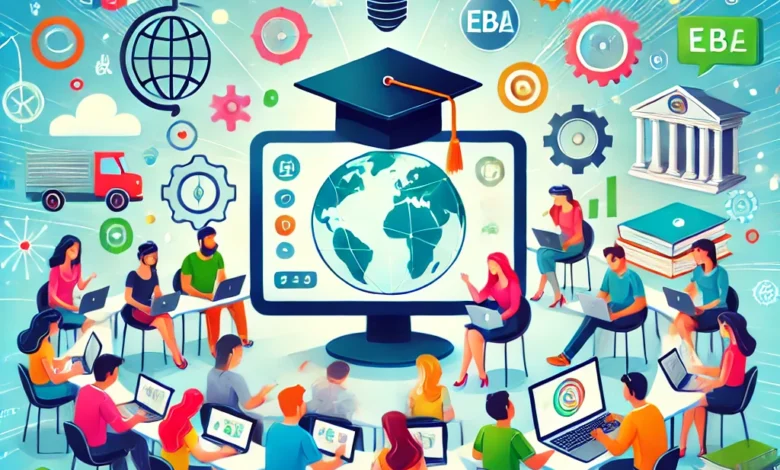Online Education: Empowering Learners in the Digital Age

Online education has become a game-changer in the realm of learning, providing unparalleled opportunities and advantages that traditional education models struggle to match. From its incredible flexibility to its cost-effectiveness, the benefits of online education are vast and varied. This article explores the positive aspects of online education, demonstrating how it is revolutionizing the way we learn and paving the way for the future of education.
The Growing Popularity of Online Education
In recent years, online education has surged in popularity, driven by technological advancements and the increasing need for flexible learning options. As the world becomes more interconnected, the demand for education that transcends geographical boundaries has never been greater. Online education meets this demand, offering a learning environment that is as diverse as the learners it serves.
This article aims to highlight the numerous benefits of online education, showcasing how it empowers individuals by providing them with access to high-quality education, regardless of their location, schedule, or financial situation.
The Flexibility of Online Education
One of the most significant advantages of online education is its flexibility. Unlike traditional classroom settings, online education allows students to learn on their own schedule. Whether you’re a full-time employee, a stay-at-home parent, or a night owl who prefers studying at odd hours, online education offers the freedom to learn when it suits you best.
Balancing education with work and personal life becomes much easier when you can attend classes from the comfort of your home, at your own pace. This flexibility is particularly beneficial for those who have other commitments, enabling them to pursue their educational goals without sacrificing other important aspects of their lives.
Moreover, online education caters to different learning styles. Whether you prefer video lectures, reading materials, or interactive assignments, online platforms often offer a variety of resources to match your preferred learning method. This adaptability makes it easier for students to engage with the material and succeed in their studies.
Accessibility and Inclusivity
Online education has opened doors to learning for people who might not have had the opportunity otherwise. By breaking down geographical barriers, it allows students from all over the world to access high-quality education without the need to relocate. This is particularly beneficial for individuals living in remote areas or in countries where access to education is limited.
Furthermore, online education promotes inclusivity by offering learning opportunities to underserved communities. Whether it’s a rural village with limited educational infrastructure or a bustling city where traditional schools are overcrowded, online education provides an alternative that is both effective and accessible.
Students with disabilities also benefit greatly from online education. Many platforms are designed with accessibility in mind, offering features like screen readers, subtitles, and adjustable fonts. This ensures that students with physical or learning disabilities can participate fully in their education, leveling the playing field and promoting equal opportunities for all.
Affordability and Cost-Effectiveness
Another compelling advantage of online education is its affordability. Traditional education can be expensive, with costs that include tuition, textbooks, commuting, and housing. Online education, on the other hand, often offers lower tuition rates and the ability to access free or low-cost materials online.
Students can save money on commuting and housing by studying from home. This not only reduces their financial burden but also allows them to allocate more resources toward their education, such as purchasing additional learning materials or investing in technology that enhances their learning experience.
From a societal perspective, the economic benefits of online education are significant. By reducing the financial barriers to education, more people can gain the skills and knowledge needed to contribute to the economy. This can lead to a more educated workforce, higher employment rates, and overall economic growth.
Personalized Learning Experiences
One of the most exciting aspects of online education is the ability to personalize the learning experience. Traditional education often follows a one-size-fits-all approach, which may not suit every student. Online education, however, allows for a tailored curriculum that adapts to the needs and pace of the individual learner.
Advanced technology, including artificial intelligence (AI), plays a crucial role in this personalization. AI can analyze a student’s performance and suggest resources or adjustments to the curriculum to better suit their learning style. This individualized support can make a significant difference in a student’s academic success.
Additionally, online education provides real-time feedback and assessment, allowing students to track their progress continuously. This immediacy helps learners identify areas where they need to improve and gives them the tools to make those improvements quickly and effectively.
A Wide Range of Courses and Programs
Online education offers an extensive range of courses and programs that cater to a diverse set of interests and career goals. Whether you’re looking to learn a new language, develop a professional skill, or pursue a degree, there’s likely an online course that meets your needs.
This variety is one of the most appealing aspects of online education. It allows students to explore subjects they are passionate about, without being limited by the offerings of a local institution. Moreover, the ability to access courses taught by global experts adds tremendous value to the learning experience.
Continuing education and professional development have also become more accessible through online platforms. Professionals can stay up-to-date with industry trends and acquire new skills without needing to take time off work. This ensures that they remain competitive in their fields and can advance their careers more effectively.
Technology and Innovation in Online Learning
The integration of technology in online education has led to innovative learning experiences that go beyond traditional methods. Interactive tools and platforms, such as virtual classrooms, discussion boards, and multimedia resources, enhance the learning process and make it more engaging.
Gamification is another exciting trend in online education. By incorporating game-like elements, such as quizzes, badges, and leaderboards, online courses can motivate students to participate actively and complete their assignments. This approach not only makes learning fun but also increases retention and comprehension of the material.
Furthermore, emerging technologies like Virtual Reality (VR) and Augmented Reality (AR) are beginning to play a role in online education. These technologies create immersive learning environments that allow students to experience scenarios that would be impossible in a traditional classroom. For example, medical students can practice surgery in a virtual environment, or history students can explore ancient civilizations in a 3D space.
Enhanced Collaboration and Networking Opportunities
Contrary to the misconception that online education is isolating, it actually offers numerous opportunities for collaboration and networking. Many online courses incorporate group projects, discussion forums, and peer reviews, allowing students to interact with one another and learn collaboratively.
Building connections with peers from around the world is a significant advantage of online education. These global networks can lead to lifelong friendships, professional partnerships, and a deeper understanding of different cultures and perspectives.
Moreover, online study groups and forums provide a platform for students to share ideas, ask questions, and support each other in their learning journey. This sense of community can be incredibly motivating and helps students feel less isolated, even when they are studying alone.
Self-Discipline and Time Management
Online education requires a high level of self-discipline and time management, which are essential skills in both academic and professional settings. Without the structure of a traditional classroom, students must take responsibility for their own learning, setting goals, and adhering to deadlines.
While this might seem challenging, it actually prepares students for the real world, where self-motivation and time management are critical to success. Online education teaches students how to prioritize tasks, manage their time effectively, and stay focused on their goals—skills that are invaluable in any career.
The ability to manage one’s own learning also fosters a sense of ownership and accountability, which can lead to greater satisfaction and achievement in both education and personal life.
The Future of Online Education
The future of online education looks incredibly promising, with trends indicating that it will continue to grow and evolve. As technology advances, we can expect online education to become even more interactive, personalized, and accessible.
One of the most exciting developments is the integration of AI and machine learning in education. These technologies have the potential to revolutionize how we learn, offering personalized experiences that adapt in real-time to the needs of the student. This could lead to even higher levels of student engagement and success.
Moreover, online education is likely to play a central role in global educational reform. As more people recognize the benefits of online learning, it could lead to a shift away from traditional education models toward more flexible, inclusive, and innovative approaches.
Success Stories and Case Studies
There are countless success stories that demonstrate the positive impact of online education. From professionals who have advanced their careers through online courses to students who have overcome significant obstacles to achieve their educational goals, these stories highlight the transformative power of online learning.
Testimonials from students who have thrived in online education often emphasize the flexibility, accessibility, and personalized support they received. These individuals have not only gained valuable knowledge and skills but have also built confidence in their ability to learn independently and succeed in their chosen fields.
The impact of online education on career growth is particularly noteworthy. Many students have used online courses to gain the qualifications needed for promotions, career changes, or entrepreneurial endeavors. This demonstrates how online education can open doors to new opportunities and help individuals achieve their professional aspirations.
Debunking Myths About Online Education
Despite its many advantages, online education is often subject to misconceptions. One common myth is that online education is of lower quality than traditional education. However, numerous studies have shown that online courses can be just as rigorous and effective as their in-person counterparts.
Another misconception is that employers do not value online degrees. In reality, many employers recognize the commitment and self-discipline required to complete an online course, and they often view online education as a sign of a candidate’s dedication to continuous learning and self-improvement.
It’s also important to address the myth that online education is isolating. As mentioned earlier, online education offers ample opportunities for collaboration, networking, and community building. Students who participate actively in these aspects of online learning often find that they are just as engaged—if not more so—than they would be in a traditional classroom setting.
Environmental Impact of Online Education
Online education is not only beneficial for students but also for the environment. By reducing the need for commuting, online education significantly lowers carbon emissions. This contributes to a smaller carbon footprint and helps combat climate change.
The shift from paper-based to digital learning materials is another positive environmental impact of online education. With more resources available online, there’s less demand for printed textbooks, notebooks, and other paper products. This reduction in paper usage not only saves trees but also decreases the energy and water required to produce paper.
Over time, the environmental benefits of online education could have a substantial impact on the planet, making it a more sustainable choice for future generations.
The Role of Educators in Online Education
Educators play a crucial role in the success of online education. As the digital classroom becomes more prevalent, teachers are adapting their methods to suit the online environment. This involves developing new skills, such as using technology effectively, creating engaging online content, and managing virtual classrooms.
Teacher training is essential for the successful implementation of online education. Educators need to be equipped with the tools and knowledge to teach effectively online, ensuring that students receive the same high-quality education they would in a traditional classroom.
Building strong teacher-student relationships is also important in online education. Despite the physical distance, teachers can foster connections with their students through regular communication, personalized feedback, and supportive interactions. These relationships are vital for student engagement and success.
Conclusion
Online education has transformed the way we learn, offering a flexible, accessible, and cost-effective alternative to traditional education. With its ability to adapt to individual needs, provide a wide range of courses, and foster global connections, online education is empowering learners and shaping the future of education.
As technology continues to advance, the potential for online education will only grow, making it an increasingly important part of the global educational landscape. Whether you’re looking to advance your career, pursue a passion, or simply learn something new, online education offers the tools and opportunities to help you achieve your goals.
FAQs
- What are the key benefits of online education?
- Online education offers flexibility, accessibility, affordability, and personalized learning experiences, making it a highly advantageous option for learners of all backgrounds.
- How does online education compare to traditional education?
- While both have their merits, online education provides greater flexibility and access to a wider range of courses, making it a suitable alternative for many students.
- Can online education be as effective as face-to-face learning?
- Yes, studies have shown that online education can be just as effective, especially when courses are well-designed and students are motivated.
- How do students stay motivated in online courses?
- Students can stay motivated by setting clear goals, managing their time effectively, participating in online communities, and seeking support when needed.
- What are the future prospects of online education?
- The future of online education looks bright, with continued advancements in technology likely to enhance the learning experience and make education more accessible to all.

